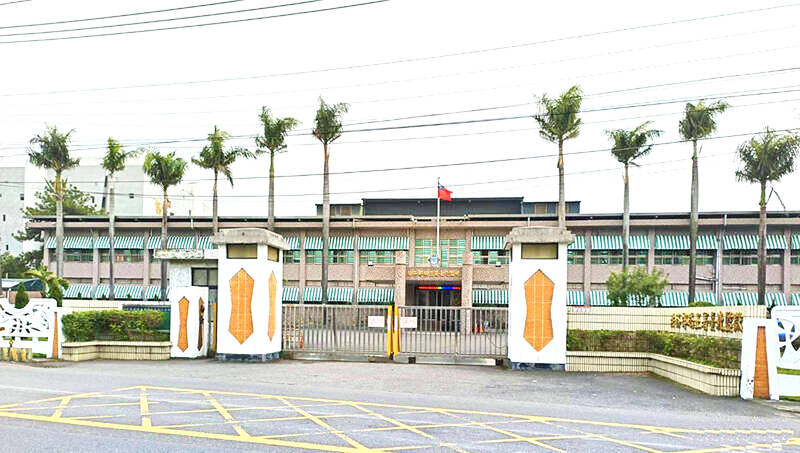The Central Election Commission (CEC) yesterday said that it would appeal a court decision to allow inmates to vote, citing security concerns and a lack of legal precedent.
The Taipei High Administrative Court on Thursday ruled that a voting station should be set up inside Taipei Prison in Taoyuan’s Gueishan District (龜山) so inmates could vote in January’s presidential and legislative elections.
An inmate surnamed Lin (林) had filed the lawsuit, with guidance from inmate rights group Prison Watch, arguing that he has a right to vote that cannot be revoked, despite being incarcerated.

Photo: Wu Cheng-feng, Taipei Times
Lin had asked that a voting booth be set up at the prison, as he was unable to leave.
The court said that special voting booths are not a subject with legal standing, overriding the CEC’s argument that there were no regulations or precedent to set up a polling booth in a prison.
The lack of precedent was an insufficient reason to deny voting rights, it said.
CEC Chairman Lee Chin-yung (李進勇) and Minister of Justice Tsai Ching-hsiang (蔡清祥) yesterday presented separate reports at the legislature in Taipei.
The CEC would file an appeal over security concerns, Lee told reporters, adding that an inmate must be alone when marking a ballot inside a curtained booth that guards cannot enter.
In principle, an inmate would have their restraints removed, as people are not permitted to take devices, weapons or other dangerous items into voting booths, he said.
The other main issue is that Taiwan has no process for absentee voting, so there is no precedent to set up a voting station inside a prison, he said.
“Taiwan does not have absentee voting, mail-in ballots, voting via proxy or electronic voting as other countries do,” Lee said.
People must vote at stations according to their household registration, he said.
“To protect inmates’ voting rights, changes must be made to the legal framework to establish absentee voting or other means of casting ballots outside residency,” Lee said. “That would be the right way to do it.”
Tsai said the case is still pending, as the CEC would file an appeal.
A new ruling would have to be made before any action by the Agency of Corrections, which administers the nation’s incarceration facilities, Tsai added.
Chinese Nationalist Party (KMT) Legislator Lin Szu-ming (林思銘) asked the CEC and the ministry not to appeal the ruling.
The law should be amended to specify “absentee voting for inmates” to guarantee their right to vote, Lin said.
Additional reporting by CNA

AIR SUPPORT: The Ministry of National Defense thanked the US for the delivery, adding that it was an indicator of the White House’s commitment to the Taiwan Relations Act Deputy Minister of National Defense Po Horng-huei (柏鴻輝) and Representative to the US Alexander Yui on Friday attended a delivery ceremony for the first of Taiwan’s long-awaited 66 F-16C/D Block 70 jets at a Lockheed Martin Corp factory in Greenville, South Carolina. “We are so proud to be the global home of the F-16 and to support Taiwan’s air defense capabilities,” US Representative William Timmons wrote on X, alongside a photograph of Taiwanese and US officials at the event. The F-16C/D Block 70 jets Taiwan ordered have the same capabilities as aircraft that had been upgraded to F-16Vs. The batch of Lockheed Martin

GRIDLOCK: The National Fire Agency’s Special Search and Rescue team is on standby to travel to the countries to help out with the rescue effort A powerful earthquake rocked Myanmar and neighboring Thailand yesterday, killing at least three people in Bangkok and burying dozens when a high-rise building under construction collapsed. Footage shared on social media from Myanmar’s second-largest city showed widespread destruction, raising fears that many were trapped under the rubble or killed. The magnitude 7.7 earthquake, with an epicenter near Mandalay in Myanmar, struck at midday and was followed by a strong magnitude 6.4 aftershock. The extent of death, injury and destruction — especially in Myanmar, which is embroiled in a civil war and where information is tightly controlled at the best of times —

China's military today said it began joint army, navy and rocket force exercises around Taiwan to "serve as a stern warning and powerful deterrent against Taiwanese independence," calling President William Lai (賴清德) a "parasite." The exercises come after Lai called Beijing a "foreign hostile force" last month. More than 10 Chinese military ships approached close to Taiwan's 24 nautical mile (44.4km) contiguous zone this morning and Taiwan sent its own warships to respond, two senior Taiwanese officials said. Taiwan has not yet detected any live fire by the Chinese military so far, one of the officials said. The drills took place after US Secretary

THUGGISH BEHAVIOR: Encouraging people to report independence supporters is another intimidation tactic that threatens cross-strait peace, the state department said China setting up an online system for reporting “Taiwanese independence” advocates is an “irresponsible and reprehensible” act, a US government spokesperson said on Friday. “China’s call for private individuals to report on alleged ‘persecution or suppression’ by supposed ‘Taiwan independence henchmen and accomplices’ is irresponsible and reprehensible,” an unnamed US Department of State spokesperson told the Central News Agency in an e-mail. The move is part of Beijing’s “intimidation campaign” against Taiwan and its supporters, and is “threatening free speech around the world, destabilizing the Indo-Pacific region, and deliberately eroding the cross-strait status quo,” the spokesperson said. The Chinese Communist Party’s “threats